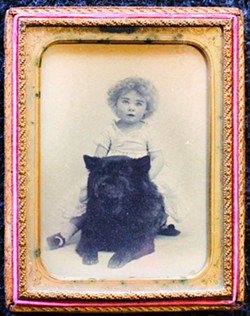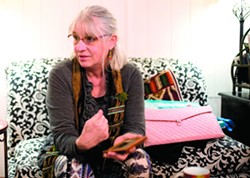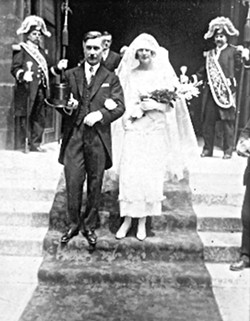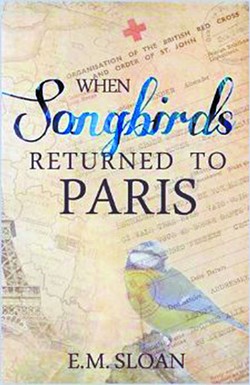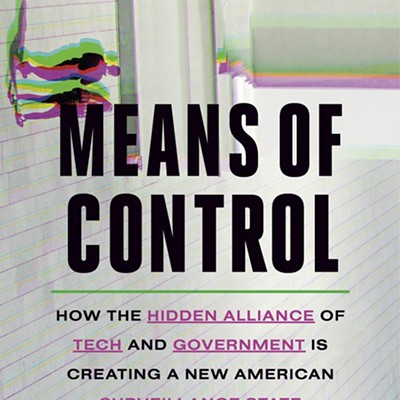by Jennifer K. Bauer jkbauer@inland360.com
MOSCOW -- For generations the family passed down the 1901 black and white photo of a cherubic girl in a white dress sitting astride a black Chow.
More than once Elizabeth Sloan asked her mother who it was.
“That is your grandmother’s cousin, Cecily Close. She was a spy during World War I and helped British pilots escape from France. She was executed,” her mother said.
The girl’s fate haunted Sloan, 61, of Moscow, who has spent more than a decade of her life tracking down the truth. It turned out her mother was wrong about the name and the war. Cecily Margot Gordon Lefort was an English spy in France during World War II and met her fate at Ravensbrück, the largest concentration camp for women in the German Reich.
In “When Songbirds Returned to Paris,” Sloan tells Lefort’s story in the form of a dialogue between her and the woman, a work of creative nonfiction combining historical documents, interviews and family lore in an attempt to recover Lefort’s life from the past.
“When I began I felt I didn’t have any right to imagine what it was like,” said Sloan, who moved from Grangeville to Moscow in 2003 to pursue a master’s degree in creative writing at the University of Idaho to tell the story.
Sloan wrote to distant relatives in England and France. She traveled to France’s Ministry of Defense with a translator. Later, Lefort’s English files shed a different light on everything she’d learned. In a surreal twist, her search led her to an Icelandic woman who claimed to have detailed visions of Lefort’s life and had obtained some of her papers from her family.
“I realize this story is too involved to be told over a glass of Cointreau at a cocktail party,” Lefort said in the book. “Please settle back and stay the course.”
Her life began in turmoil.
Her English mother, Margaret Close, wed Eric Gordon but was in love with his older cousin, the married Lord Granville Gordon. Around the time of her childhood photo, Hearst news covered the paternity trial over Cecily in which her mother insisted Granville was the father. The court ruled against her. Stripped of her privileged social standing, Margaret fled to France with her daughter. Granville joined them but their lives together was brief. While the three sailed for the Orient, Granville, who Cecily called “Granny,” died of pneumonia.
Raised in France, she worked as a nurse during World War I where she met and married Alix Lefort, a doctor, in 1924. They had a beautiful life, Sloan said, with a flat in Paris and a villa on the Brittany coast purchased with her family’s money. She had horses, sailed yachts and was friends with prominent salon artists.
In 1940, when the Germans invaded France, British citizens were urged to return to England and Lefort did. After the invasion England created the Special Operations Executive, a secret organization to help resistance movements and conduct espionage in enemy-held territories. Being well connected and fluent in French, Lefort was recruited as a spy, unbeknownst to her husband. She was on the same flight to France in 1943 as British special agent Krystyna Skarbek whose story is detailed in the acclaimed 2013 biography “The Spy Who Loved.”
“The average agent only lasted about five months,” Sloan said about the danger Lefort faced.
She made it three. Her trail ended at Ravensbrück. Medical experiments were conducted at the concentration camp and she underwent an operation for stomach cancer, Sloan said.
The camp had gas chambers. No one saw Lefort die and there are differing accounts about what may have happened.
“It’s still a mystery. I think I’m going to find more. I think there is still more to be revealed,” said Sloan, who teaches at the UI and is an artist.
She believes Lefort would approve of her work to unravel the story.
“She’s not forgotten. She didn’t get swept away. The Nazis didn’t get away with destroying her life.”
What: Reading by Elizabeth Sloan, author of “When Songbirds Returned to Paris” When: 5:30 to 7 p.m. Monday, Feb. 22 Where: Neill Public Library, Pullman Cost: Free
“When Songbirds Returned to Paris,” 260 pages, Booktrope Editions, is $15.95 and is available online, at BookPeople of Moscow and as an e-book.

